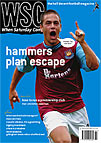 Martin Edwards' unpopular reign at Old Trafford is reassessed by Ashley Shaw, putting forward another side of the argument
Martin Edwards' unpopular reign at Old Trafford is reassessed by Ashley Shaw, putting forward another side of the argument
Martin Edwards is a misunderstood figure. The well publicised attempts to sell his controlling interest in Manchester United have clouded supporters’ judgements of the progress made at the club under his chairmanship. Fans consistently forget his key role in establishing the club as the dominant economic power in British football, making Manchester United a respected name from the City to the Champions League.
It is worth remembering the state of Edwards’ inheritance. United were struggling in 1980, indeed Manchester City were about level in terms of attendance and income in this period, yet Edwards has presided over an exponential growth in the club that beggars belief. Ultimately his legacy should be that he turned a million-pound company into a billion-pound one, but with his critics still sore about the thwarted Sky deal, there’s little hope that his chairmanship will receive a balanced epitaph.
In the eyes of his critics the credit for the successful parts of his reign – the appointment of Alex Ferguson, sticking by him in a crisis and expanding the merchandising arm at a phenomenal rate – are typically given to others. While the unsuccessful bits – his refusal to allow Ferguson carte blanche on transfers, his row with the manager at the end of the 2000-01 season over his retirement and his attempts to sell his controlling interest in the club on four occasions – are highlighted.
Yet his chairmanship, to crib the title of a well known book, did not constitute “the betrayal of a legend” any more than the behaviour of certain former managers, players and directors did. The difference is that Edwards has profited most from United’s expansion from club to brand – a situation that has left many fans seething.
Nevertheless, Edwards’ belief in stability has been the cornerstone of United’s growth both as a football club and a business. He worked with only three managers in 24 years and appointed just two of them. Key to this stability was Edwards’ reticence. He knew his limits: he avoided any active involvement in the playing side in favour of the logical appointment of individuals ideally suited to turning Manchester United into a worldwide brand. For this reason I wouldn’t blame Edwards if he felt a little galled at the suggestion that United succeeded “in spite of rather than because of” his chairmanship.
But then he’s never been popular. As far back as the early Eighties, Edwards’ name was booed to the echo. To the regular supporter he was a figure of fun, a public schoolboy living off the labours of his father, who in turn had lived off the legendary status of Sir Matt Busby’s and his great teams. As a result his softly spoken, accountant demeanour was anathema to the Red Army with their love of the garrulous and maverick.
And this was another key element in Edwards’ success. Had he been umbilically linked to United he would have listened to the supporters who wanted to sack Ferguson, or spent more on players and less on the merchandising side (to the long-term detriment of the club). Fergie’s attempts to sign, among others, David Hirst and Gabriel Batistuta may have succeeded. It’s no coincidence that since Edwards has left the plc board, Sir Alex has been allowed to have his way with the club’s coffers – the combined £65 million spent on Veron, Ferdinand and Forlan being a case in point.
On the playing side, Edwards’ two most important decisions were made within a four-year period at the end of the Eighties. Appointing Alex Ferguson was crucial, though even here Edwards’ critics claim the credit belongs to Bobby Charlton, while it has also been suggested that Charlton was the one to stay Fergie’s execution during the make-or-break 1989-90 season.
On this point Edwards appears to have suffered for listening to the advice of a well placed colleague rather than the fans, who wanted Bryan Robson as the Scot’s successor. Fortunately, Edwards stuck by his man and, after years of underachievement, United found the stability and figurehead they required.
Now the tricky bit: it is hard to condone Edwards’ attempts to sell United to Michael Knighton and Rupert Murdoch, but it is important to understand it. According to a close friend he was so willing to sell because “he thinks the whole lot [his shares] will be worthless by tomorrow afternoon”.
By this thought process Edwards can be seen as the polar opposite of the typical modern-day chairman: the kind of serious businessman who gambles his club’s future on promotion and a new 30,000-seat stadium he hopes to fill in three seasons’ time. By contrast Edwards saw a club the size of United as over-valued, a product of modern-day hyperbole. The thought occurs that if only more chairmen shared his scepticism, football might not be facing the prospect of long-term penury, and deals with the likes of ITV Digital could be seen in their true light.
Above all, throughout his chairmanship Edwards withstood the weight of expectation. This wasn’t his club, remember, rather he had been bequeathed a controlling share in this worldwide religion by his father. With millions of fans hanging on the outcome of every game, millions to be lost if it all went wrong and, later, a stock market eager to see dividends – he had to square the circle from day one. Nevertheless, Edwards’ trick was to make United’s rise appear inevitable – it wasn’t, just look at the rest of English football.
From WSC 192 February 2003. What was happening this month